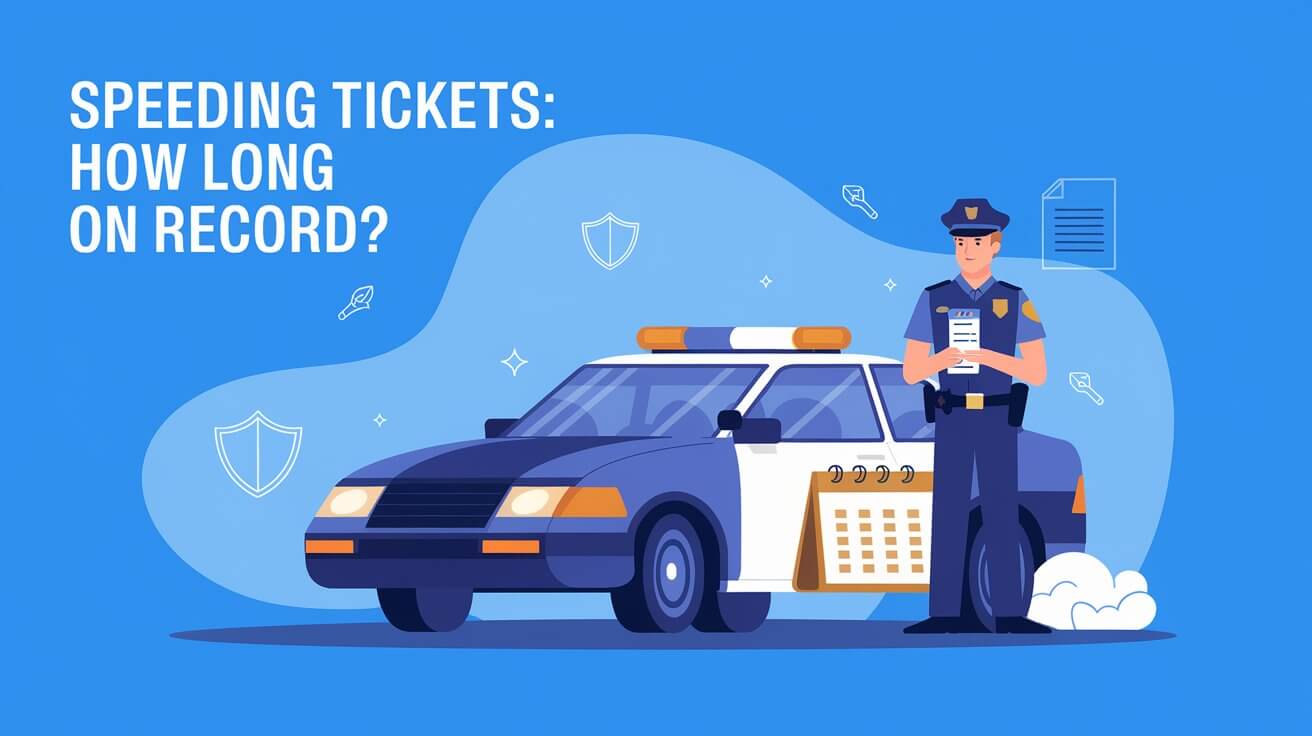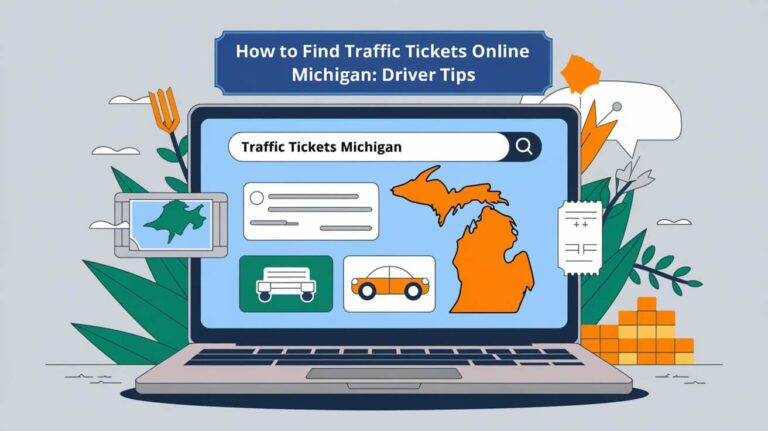
A speeding ticket can greatly affect your driving record and car insurance costs. The time a speeding ticket stays on your record varies by state. It can range from one year to forever, which can increase your insurance rates. Knowing how long a speeding ticket will impact your insurance is key to planning ahead.
In the U.S., the points system for speeding tickets varies by state. More serious violations add more points to your record. This makes it hard to predict how a speeding ticket will affect your insurance. It’s important to know your state’s laws to avoid higher insurance rates.
Timeline of Speeding Tickets on Insurance Records
Speeding tickets can greatly affect your insurance records. The time they stay on record varies by state. For example, in Alaska, they last one year, but in Alabama, they last forever. Knowing how long speeding tickets stay on your record is key for choosing the right insurance.
In Texas, speeding tickets are on your record for three years. They can raise your auto insurance rates by about 13%. The speed you were going also matters. Faster speeds mean higher rate increases.
State-by-State Duration Variations
Here are some examples of how long speeding tickets stay on record in different states:
- Alaska: 1 year
- Alabama: permanent
- Texas: 3 years
Drivers need to know their state’s laws to lessen the impact of speeding tickets on their insurance.
Insurance Company Policies
Insurance companies have their own rules about speeding tickets and points. Some might raise rates more than others. Others might lower rates if you take a defensive driving course. Knowing these policies helps drivers choose the best insurance and reduce the effects of speeding tickets.
Rate Increase Patterns After Speeding Violations
A speeding ticket can really raise your car insurance rates. On average, rates go up about 25% after a ticket. This can make your annual full coverage insurance cost jump to $2,486. But, the exact increase depends on where you live, your insurance company, and how serious the ticket was.
Some companies, like State Farm, might only raise rates by about $22 a month. But others could increase rates more. For example, in Michigan, rates might go up by $124 a month. In Vermont, the increase could be just $19 a month.
Several things can influence how much your rates go up: * How serious the violation was * Your driving history * The insurance company’s rules * State laws and regulations * How many speeding tickets you’ve had * Where the ticket was given
Insurance companies look at your driving history for 3 to 5 years. Violation points usually stay on your Motor Vehicle Record (MVR) for 2 to 3 years. If you get multiple tickets close together, it shows you’re speeding a lot. This can make your insurance company think you’re a higher risk, leading to higher premiums or even not renewing your policy.
DMV Record vs Insurance Record Differences
Driving records come in two forms: DMV records and insurance records. DMV records are kept by the Department of Motor Vehicles. They include details about your driver’s license, traffic violations, and more. Insurance records, on the other hand, are kept by insurance companies. They show your insurance history, including claims and policy details.
In the United States, DMV records track your traffic violations and driving info. Insurance companies look at both DMV records and their own data to set premiums. The key difference is that DMV records focus on licensing and traffic enforcement. Insurance records, by contrast, help determine your insurance rates and coverage.
State DMV Reporting Requirements
Every state has its own rules for reporting to DMV records. For instance, some states require all traffic violations to be reported. Others only need certain types. Insurance companies also have varying access to these records, based on the state and policy type.
Insurance Company Access to Records
Insurance companies can see DMV records, but access levels differ. Some may also look at credit reports or claims history. Knowing the difference between DMV and insurance records helps drivers make better insurance choices. By understanding how these records impact rates, drivers can keep their costs down and maintain a clean driving record.
Impact of Multiple Speeding Violations
Getting multiple speeding tickets can really raise your insurance costs. If you get two or more tickets in three years, your insurance will likely go up. Some companies might even increase your rates by up to 33% after just one ticket.
In places like South Carolina, speeding fines can be between $15 and $200. Your insurance might go up by about 19% after a speeding ticket. To lessen the premium hike, you could take a defensive driving course. This might lower your points by four after a ticket. Also, telematics programs can show that speeding was just a one-time thing, helping to keep your rates down.
Here are some ways to lower your insurance costs after a speeding ticket:
- Lowering coverage limits
- Raising deductibles
- Exploring non-driving-related discounts
The severity of the ticket and the points on your license matter a lot. Big infractions like reckless driving or DUIs can lead to even higher rate increases. Knowing how speeding tickets affect your insurance can help you avoid big hikes. By being aware, you can take steps to keep your rates lower.
Insurance Premium Calculation Methods
Insurance companies look at many factors to figure out how much to charge. They check your driving history, what kind of car you drive, and other personal details. This helps them guess how likely you are to make a claim.
Assessing risk is key in figuring out your insurance cost. They use things like your driving record, car type, and where you live. For example, if you’ve had speeding tickets or accidents, you might pay more. The type of traffic violation also plays a big role, with more serious ones leading to bigger premium hikes.
Risk Assessment Factors
- Driving history, including speeding tickets and accidents
- Vehicle type, including make, model, and year
- Location, including state and zip code
- Personal characteristics, including age, gender, and marital status
Premium Adjustment Timeframes
Getting a traffic ticket can make your insurance go up. The severity of the ticket affects how much it goes up. Traffic tickets usually stay on your record for three to five years.
But, insurance companies might remember past tickets even if they’re not on your record anymore. This can affect how much you pay for insurance.
State Laws and Insurance Record Policies
State laws greatly affect how speeding tickets impact your insurance. Each state has its own rules about how long a ticket stays on your record. This, in turn, changes your insurance rates. For example, in California, a ticket stays on your record for 3 years. In Florida, it’s 5 years.
Insurance policies also vary by state. In Ohio, records are kept forever. New York keeps them for 1.5 years. Knowing these rules helps drivers understand how a ticket might raise their insurance costs. On average, a ticket can increase rates by 33%, or about $570 a year.
Here are some examples of how different states handle speeding tickets and their impact on insurance records:
- California: 3 years
- Florida: 5 years
- Georgia: 2 years
- Illinois: Up to 5 years
- Michigan: 7 years
Drivers need to know their state’s laws and insurance policies. This knowledge helps them make better choices about driving and insurance.
Methods to Reduce Insurance Impact
Receiving a speeding ticket can significantly increase your insurance premiums. On average, it can go up by 25% or more. But, there are ways to lessen this effect. One good way is to sign up for a traffic school. This can cut down the points on your record and might lower your insurance costs.
Another strategy is to join safe driver programs. These programs give rewards for driving safely. They can offer discounts on insurance and help cover the cost of a speeding ticket.
Strategies for Reducing Insurance Impact
- Enroll in a state-approved traffic school to reduce points on your record
- Participate in safe driver programs to earn discounts on insurance premiums
- Compare car insurance quotes to find the best rates after a speeding ticket
- Consider increasing your deductible to lower insurance premiums
Taking these steps, drivers can lessen the effect of a speeding ticket on their insurance costs. It’s key to look into these options and find what works best for you.
| Method | Benefits |
|---|---|
| Traffic School | Reduced points on record, lower insurance premiums |
| Safe Driver Programs | Discounts on insurance premiums, rewards for safe driving |
Insurance Company Violation Forgiveness Programs
Some insurance companies offer forgiveness or reduced penalties for first-time offenders. They also have programs for those who complete specific courses. These programs can help protect your finances and give you peace of mind.
For example, accident forgiveness programs prevent premium hikes after your first accident. Companies like Geico, State Farm, and Allstate have different forgiveness programs. They might offer discounts for defensive driving courses or not raise rates for minor tickets.
Here are some key points to consider about insurance company forgiveness programs:
- Accident forgiveness programs are available from some insurance companies, protecting policyholders from premium increases after their first at-fault accident.
- Defensive driving courses can lead to insurance discounts, with some states giving a 10% car insurance discount for completing these courses.
- Shopping around for better rates from different insurance providers is advisable after receiving a violation.
- Some insurance companies offer violation forgiveness programs, which can help policyholders avoid premium increases for minor tickets.
When looking for insurance company forgiveness programs, it’s essential to research and compare different providers. Policyholders should also review their insurance policies and ask about available discounts and forgiveness programs. By taking advantage of these programs, policyholders can reduce their insurance premiums and enjoy financial protection.
| Insurance Company | Forgiveness Program | Discount |
|---|---|---|
| Geico | Accident Forgiveness | Up to 25% discount |
| State Farm | Steer Clear | Up to 15% discount |
| Allstate | Drivewise | Up to 30% discount |
How Long Does Speeding Ticket Stay On Record For Insurance
The time a speeding ticket stays on your insurance record varies by state and insurance company. In Oregon, for instance, a speeding ticket can affect your insurance for five years. After that, the ticket is removed from your record. Yet, some insurers might keep this info for more years.
In North Carolina, getting a speeding ticket can add points to your insurance record. Some tickets can even add two points. These points can stay on your record for up to three years. Knowing how long a speeding ticket lasts and its effect on insurance is key to avoiding big costs.
Things that can raise your insurance rates after a speeding ticket include getting multiple tickets quickly. Also, tickets that lead to accidents can make your insurance even more expensive. To keep costs down, compare insurance quotes, drive safely, and ask about discounts for safe drivers.
| State | Speeding Ticket Duration | Insurance Rate Increase |
|---|---|---|
| Oregon | 5 years | 28-44% |
| North Carolina | up to 3 years | 25-340% |
Drivers can reduce financial losses by understanding the effects of speeding tickets on insurance. This knowledge helps keep insurance rates lower.
Clean Record Restoration Steps
To get a clean record, it’s key to know the steps and take action. A clean driving record can lower your auto insurance rates. This is because you’re seen as a safe driver.
Avoiding future violations and reducing the impact of past ones, you can improve your driving record. This helps keep your insurance rates low.
Here are some important steps for a clean record:
- Avoiding more driving violations helps remove points from your record.
- Taking safe driving classes or disputing tickets can reduce points on your license.
- Completing defensive driving courses may lead to insurance discounts for drivers with less than perfect records.
Insurance companies see drivers with clean records as lower risk. This can lead to lower insurance premiums. Some companies offer discounts for safe drivers.
Focusing on clean record restoration and improving your driving record, you can lower your insurance rates. This makes you a more attractive candidate for insurance providers.
Final Verdict
Speeding tickets can really raise your insurance costs for a long time. But, knowing how they affect your rates and acting early can help. This way, you can keep your car insurance affordable.
Driving safely and avoiding speeding is key. A single small ticket might not raise your rates much. But, getting more tickets can make your insurance go up a lot. Keeping your driving record clean helps you avoid these high costs.
If you get a ticket, look into defensive driving courses or talk to the court. This can lessen the impact on your insurance. Knowing your state’s laws and insurance rules helps you make smart choices. This protects your driving record and wallet.
The real issue with speeding tickets is not just the fines. It’s the long-term effect on your insurance rates. By choosing safe driving and being informed, you can manage your insurance costs. This lets you enjoy driving without worrying about the high costs of a ticket.
Common Questions
How long does a speeding ticket stay on my insurance record?
The time a speeding ticket stays on your insurance record varies. It depends on the state and your insurance company’s rules. Usually, it’s 3-5 years, but it can be longer or shorter.
How do speeding tickets affect my insurance rates?
Speeding tickets make your insurance rates go up. The increase depends on the violation’s severity, your driving history, and your insurance company’s rules. More speeding tickets can lead to even higher rates and harsher penalties.
What’s the difference between my DMV record and my insurance record?
Your DMV record is kept by the state’s Department of Motor Vehicles. It shows your driving history, including traffic tickets. Your insurance record is kept by your insurance company. It shows what they know about your driving, which might not match your DMV record.
How can I reduce the impact of a speeding ticket on my insurance?
To lessen the effect of a speeding ticket on your insurance, you can try a few things. Attend traffic school, join safe driver programs, or look into legal defense. Some insurers offer forgiveness for first-time offenders or those who take certain courses.
How do insurance companies calculate my premium after a speeding ticket?
Insurance companies look at several things to decide how to adjust your premium after a speeding ticket. They consider the ticket’s severity, your driving history, and their own rules. They might also look at how long it takes to adjust premiums and state laws on reporting speeding tickets.
How can I work towards restoring a clean driving record?
To get a clean driving record after a speeding ticket, be proactive. Avoid future tickets, take defensive driving courses, and look into traffic school or legal defense. Keeping a clean record over time can help lower the long-term impact on your insurance rates.






